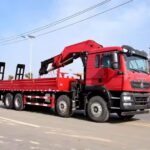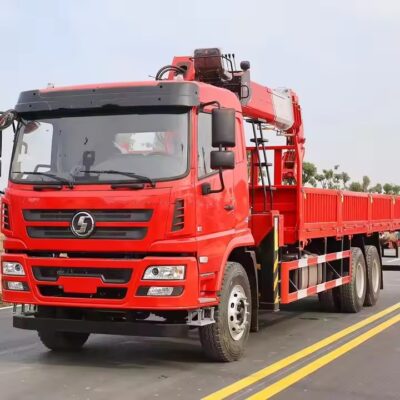Hydraulic winches are important functional components on road tow trucks. They are often used for lifting and towing operations. Hydraulic winches come in many specifications from light to heavy. Commonly used hydraulic winches include There are two structural forms: worm gear and planetary gear reduction. The winch is driven by a hydraulic motor, and the speed reduction device is used to reduce the speed and increase the output torque, thereby achieving the relatively heavy-load traction capacity of the winch. The structure of the turbine worm winch is relatively simple. It is easy to make, the transmission efficiency and production cost are relatively low, and it is generally used for medium and light hydraulic winches. The planetary hydraulic winch has a relatively complex structure, a large transmission ratio, relatively high transmission efficiency and production cost, and is generally used for medium and heavy hydraulic winches.
After the tow truck has been used for a long time, its hydraulic winch will inevitably Problems like this have occurred. Today I will tell you some problems about the failure of the hydraulic winch of the tow truck.

1. The winch or motor is leaking oil. The main reason is that after long-term use, the seal is damaged or the connecting bolt is loose. Just replace the seal and tighten the connecting bolt.
2. The winch clutch is separated and poorly connected, mainly because the clutch is misaligned or there is a problem with the clutch operating mechanism. Rotate the drum to align and check the claws. And eliminate the fault of the control mechanism.
3. When the winch is working, the pressure is unstable and trembling, mainly caused by unstable load and random jumping of the wire rope. Just rearrange the wire ropes (in Add counterweight to the hook to avoid unloading the rope).
The winch of the road tow truck must be maintained and repaired regularly to ensure the safe use of the winch and extend the service life of the winch. The lubricating oil in the hydraulic winch box needs to be replaced frequently, usually once a year. You should always check whether the winch and motor are leaking, check whether the winch installation screws are loose, check whether the wire rope is broken, worn, or deformed, and regularly use lubricant to lubricate the wire rope to ensure that the wire rope reaches scrapping conditions. , be sure to replace the new wire rope in time. In general, the winch must be used, maintained and maintained in strict accordance with the specification requirements in order to make good use of the winch and the tow truck.
In addition to the regular maintenance and troubleshooting tips mentioned above, there are a few advanced practices that can help in prolonging the life and efficiency of hydraulic winches on road tow trucks:

4. Monitor Hydraulic Fluid Quality: The hydraulic fluid is the lifeblood of the winch system. Regularly monitor the quality of the hydraulic fluid. Contaminants, water ingress, and degradation of hydraulic fluid can cause significant wear and tear on the hydraulic components. Use high-quality fluid and replace it as recommended by the manufacturer.
5. Implement a Comprehensive Inspection Routine: Beyond basic checks, implement a thorough inspection routine that includes non-destructive testing methods like ultrasonic testing for wire ropes and magnetic particle inspection for critical components. This can help in early detection of issues that are not visible to the naked eye.
6. Train Operators: Proper training of operators can significantly reduce the wear and tear on winches. Ensure that operators are well-versed with the operational limits, proper handling techniques, and emergency procedures related to the hydraulic winches.
7. Use of Protective Covers: Using protective covers for the winch and related components can prevent dirt, roskia, and moisture from causing damage. Covers also protect against harsh environmental conditions which can degrade the winch components over time.

8. Scheduled Professional Servicing: While regular checks and maintenance can be performed by in-house staff, it is beneficial to have scheduled servicing by professional technicians. They can perform detailed inspections, calibrations, and adjustments that might be beyond the scope of routine maintenance.
9. Upgrade Components When Necessary: Technology and materials in hydraulic winches continue to evolve. Consider upgrading critical components with newer, more durable options as they become available. This proactive approach can enhance performance and reliability.
10. Maintain Detailed Records: Keep detailed maintenance records, including dates, types of maintenance performed, parts replaced, and any issues encountered. This data is invaluable for tracking the winch’s performance over time and planning future maintenance.
By adhering to these advanced maintenance strategies, you can significantly improve the longevity and functionality of hydraulic winches on road tow trucks, ensuring they remain reliable assets for your towing operations. Remember, a well-maintained winch not only enhances efficiency but also contributes to the safety of the entire towing operation.









